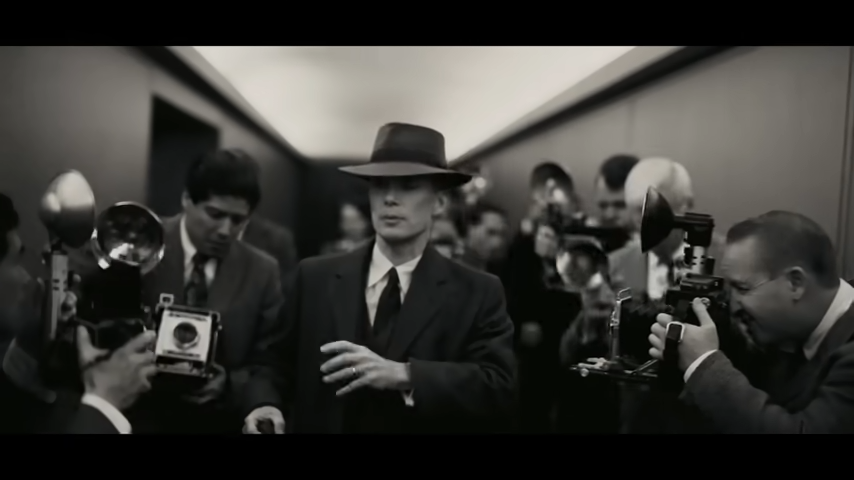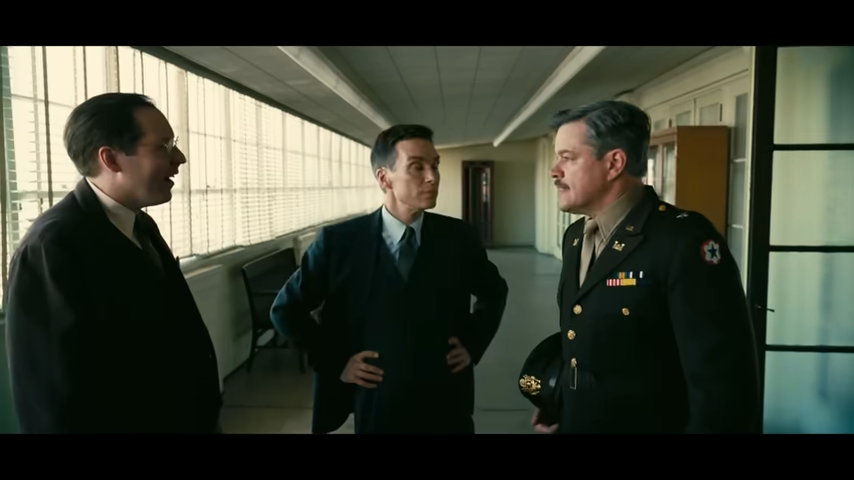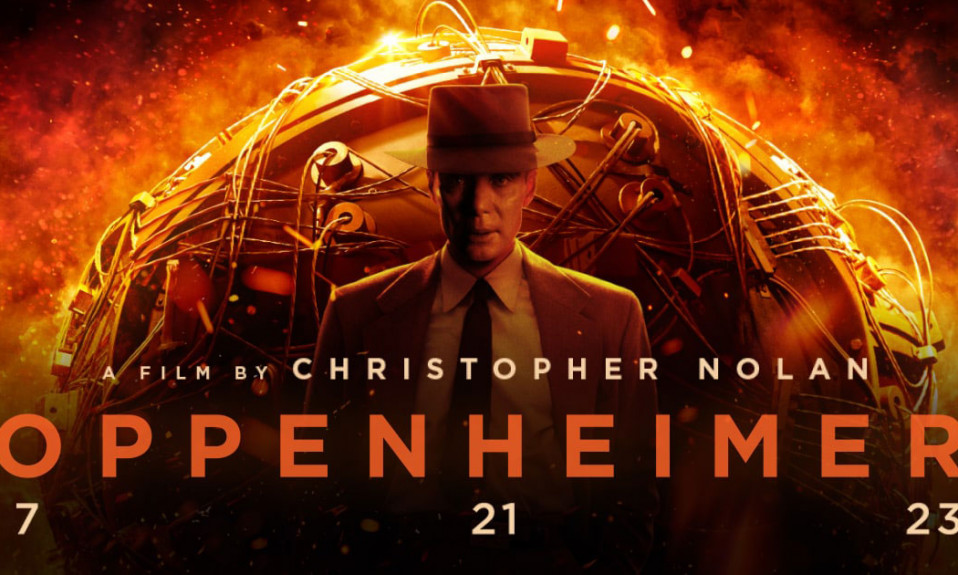Legendary filmmaker Christopher Nolan returns with Oppenheimer, a biopic of J. Robert Oppenheimer, the physicist who oversaw The Manhattan Project and the creation of the first atomic bomb.
What’s Going On?

As World War 2 rumbles on the American government recruits brilliant physicist J. Robert Oppenheimer to build an atomic bomb, a weapon made possible by recent scientific theories. Nazi Germany is also working on this weapon and had a huge head-start over America. Oppenheimer brings together every resource America has to achieve the impossible against an ongoing backdrop of political turmoil, internal conflict and managing a team of brilliant but at times extremely difficult scientists.
In Front Of The Camera

The role of Oppenheimer is played by Cillian Murphy; an actor who has been giving consistently great performances for over 20 years, whether it’s as a charismatic gangster in 1920s Birmingham or a survivor of a zombie apocalypse. Murphy has worked with Nolan before in the Dark Knight series, Inception and Dunkirk. Matt Damon plays Leslie Groves, the military man tasked with getting Oppenheimer what he needs and ensuring this is done in the correct way. Emily Blunt plays Kitty Oppenheimer, wife of the title character, Blunt has played everyone from Mary Poppins to Mech-armour wearing war hero Rita to Fizzelpop Berrytwist. The cast is packed with great actors – Kenneth Branagh, Robert Downey Jr, Florence Pugh, Rami Malek…the list goes on and there is no way to talk about them all here.
Behind The Scenes

Christopher Nolan is one of the most successful directors working today, he has made what is considered by some the greatest superhero film ever made, The Dark Knight as well as brilliant lower-budget films like Memento or The Prestige. He is known for his exacting standards and work ethic, being one of the few directors who can make blockbuster films that aren’t simply formula-driven franchises. The film is based on the 2005 Pulitzer Prize-winning biography American Prometheus by Kai Bird and Martin J. Sherwin.
Does It Work?
Oppenheimer is a great film. The film is structured around two courtroom-esque scenes – Oppenheimer appealing the decision to revoke his security clearance and the Senate approval of Lewis Strauss as position as Commerce Secretary. These are courtroom-esque as neither are trials nor in courtrooms, as is repeatedly made clear. As Oppenheimer is questioned about his past and Strass defends his own actions on his involvement with Oppenheimer. The audience sees Oppenheimer’s life play out starting at university; he studies in Europe (the best place to study quantum mechanics) and then returns to America to teach it. Through the 30s and 40s, the political turmoil of the time is always in the background – the rise of fascism, communism on university campuses and more. Then the central aspect of the film is the Manhattan Project itself, recruiting scientists, getting the resources and building a whole town to house the team. Then there is the aftermath, both Oppenheimer dealing with what he has done, his fame, as an advisor on atomic weapons and the battles over his suitability to advise the government. The film does not have a linear narrative, jumping back and forth between different periods, sometimes seemingly being instigated by questions asked of Oppenheimer or Strauss.

It is shown many times that Oppenheimer is a theoretical physicist, his laboratory work is atrocious, he likes to think about these things, study the theories and data and come up with his own theories. When news reaches the university that German scientists have split the atom Oppenheimer starts working on the mathematics, while a colleague rushes to replicate the results with their equipment. After checking the maths Oppenheimer is reassured it cannot be done, moments later his colleague returns announcing he’s just done it. And this man is put in charge of a truly immense project to turn theory into a practical device that will work in the real world. As mentioned in the film, Einstein wrote a letter to President Roosevelt spelling out the potential of a weapon along the lines of an atomic bomb, and how something as abstract as E = mc2 can lead to such a weapon. A lot of the film is about the interplay of these theoretical concepts, whether it be quantum mechanics or socialism and how they hit the real world.
Murphy is perfectly cast as Oppenheimer and carries the film well, being able to convey the myriad complex motivations of science, politics, love, family, sex, war, and apocalypse that are running through his head at all times. Damon is perfectly fine as Graves, filling in a role seen many times over. Blunt seemingly has little to do with much of the film but has moments, especially in the final third of the film, of blistering strength and courage. There are many great performances, some very minor in terms of screentime, Tom Conti as Albert Einstein, Kenneth Branagh as Niels Bohr, one that is particularly interesting is that of Josh Peck as Kenneth Bainbridge, a physicist who is the person who actually presses the button in the first test of the atomic bomb.
One of the key parts of the film – perhaps the key part- is the moral question about the atomic bomb. Should America build it and then use it? When the question is who should be the first to have one – America or the Nazis – that is Oppenheimer and most of the scientists are comfortable thinking it should be America. But when things become less clear, when the enemy is less obvious, or when thoughts about what bomb comes next, disagreements arise. The whole cast does very well in displaying the competing narratives going on in their heads, especially Murphy, and it is infuriating when characters later in the film interrogate characters about what they were thinking.
Nolan spent a lot of time working on the explosion caused by the atomic bomb, Nolan is well-known for the extreme lengths he will go to for physical effects. Along with this Nolan’s use of sound has been commented on a lot and actually is perhaps more affecting in Oppenheimer than the visuals, a recurring stamping rumbling noise that troubles Oppenheimer, that seems to overwhelm him is incredibly effective.
Oppenheimer could be the film that gets Nolan his first Oscar and it would be well deserved. It is an epic film about an extraordinary life.
Rating:  (4 / 5)
(4 / 5)
Also Read: The Anatomy of a Christopher Nolan Film















1 Comment
Comments are closed.